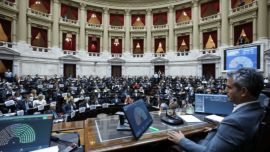Ever since taking office in late 2019, the government whose figurehead is Alberto Fernández has been pestered by people who want to know exactly what it proposes to do to make Argentina’s broken-down economy roadworthy. For a while, they let themselves be fobbed off by being told that as Mauricio Macri was to blame for everything bad, replacing him with someone as moderate, sensible and kind-hearted as Alberto would be more than enough to put things right. However, although official spokesmen have continued to go on and on about the dreadful state of what they “inherited” from the former administration, they have yet to come up with anything resembling a plan.
Does this mean they do not have one? Alberto assured the Financial Times he was against plans on principle, perhaps because he thought Anglo-Saxon “neoliberals” despised them, but since then he seems to have changed his mind, so along with his Economy Minister Martín Guzmán and others who have a say in these matters, he insists that, like every self-respecting government, his really does have a detailed plan which it is busily applying, but he would rather not tell the rest of the world what is in it. As nobody takes such obfuscations seriously, both here and abroad the consensus is that the people in government have no clear idea about what to do and are simply playing it by ear in the hope that, somehow or other, everything will work out well in the end.
There can be little doubt that those who suspect that Alberto and Guzmán do not have anything approaching a plan are right. They have no intention of coming up with one because Cristina Fernández de Kirchner and her pet ideologues are nervously aware that anything plausible would frighten almost everybody, because the men and women charged with drawing it up would have to take into account the sad fact that the country is effectively bankrupt.
The government’s brighter members must know that apart from the much reviled International Monetary Fund and the farmers Kirchnerites detest, the only reliable source of income they have left is the printing press, which fuels inflation, that the tax burden is already so heavy it is crushing whatever productive activities still remain and that, while soybeans now and, perhaps, lithium and shale gas tomorrow, may provide a little extra, it will not be enough to satisfy the demands of those who are competing desperately for bigger slices of a rapidly shrinking pie, but they are unwilling to risk their jobs by defying Cristina.
As was always bound to happen, influential foreigners who would like to see Argentina recover from her many self-inflicted wounds and, at long last, become an upstanding fee-paying member of the so-called “international community,” are getting more impatient by the day. Last week, the Deputy Secretary of the US Treasury Wally Adeyemo promised that Joe Biden’s administration would give Alberto’s team its full backing once it showed it a “strong economic policy framework,” by which he meant a plan. For some time now, IMF technocrats have been saying much the same, as have the Paris Club creditors led by the Germans and Japanese.
They are asking for the moon. Argentina’s government cannot say what it intends to do put the economy in working order, let alone draft a market-friendly plan, because even if it tries to buy time by nationalising everything in sight in a last-ditch effort to get its hands on more hard cash, sooner or later it will have to slash public spending to the bone, something it is most reluctant to do because it would then have to deal with the consequences, which could be most unpleasant. For a government that owes its very existence to the appealing notion that there is more than enough money available so it can give some to the poor, austerity is simply not an option. In the official view, belt-tightening is a “neo-liberal” vice.
The Kirchnerites who, with the acquiescence of supposedly more level-headed Peronists, dominate the government. would much rather be in charge of a country with plenty of money than one which is deep in hock and, as stern economists are fond of reminding us, has been living beyond its means for decades, so they pretend this is not really the case and behave accordingly. Though it may be assumed that members of Macri’s government were well aware that, when they took office, Argentina’s economy was in danger of falling over a cliff, they too made out that a few minor adjustments would be enough to put it on a road leading straight to development. In retrospect, they made a big mistake when they tried to persuade investors that by and large the economy was in better shape than at the time most outside observers thought, but they had good reason to fear that any attempt to do what the financial hawks among them wanted would have been met with large-scale riots followed by their downfall.
When Cristina’s second term was approaching its end, she and her then-economy minister, Axel Kiciloff, went about setting a trap for whoever came first in the upcoming elections, even if it happened to be Daniel Scioli; as far as they were concerned, the government’s own candidate was a hateful right-winger. The idea was that they would benefit by forcing the next president to choose between making an all-out effort to reduce the fiscal deficit or get battered by hyperinflation. However, despite their best efforts, Macri did manage to complete his four-year stint in office, leaving Cristina’s stand-in, Alberto, to face the same alternatives. One might say that the Kirchnerites have been hoist with their own petard.
Once populism (which can be taken to mean economic policies designed to give people what they want immediately without worrying about the long-term or even medium-term consequences of institutionalising the many entitlements this implies) is established in a country, removing it becomes progressively more difficult. Juan Domingo Perón himself learned this when he sought to bring to an end the spending spree which, several years earlier, had won him the lasting gratitude of a sizeable proportion of the country’s inhabitants.
Ever since then, many governments, including several military dictatorships, have tried to slow down the widening gap between what people demanded and what the public sector could really afford without daring to do what tough-minded economists recommended. Most plugged the gap by printing money and borrowing as much as possible. In the 1990s, Carlos Menem’s government came close to curing the country of the populist disease, but by failing to take proper advantage of the stability which for a while was made possible by Domingo Cavallo’s currency board arrangement, it merely ensured that things would continue to go from bad to worse, which is why Argentina is where she is today.























Comments